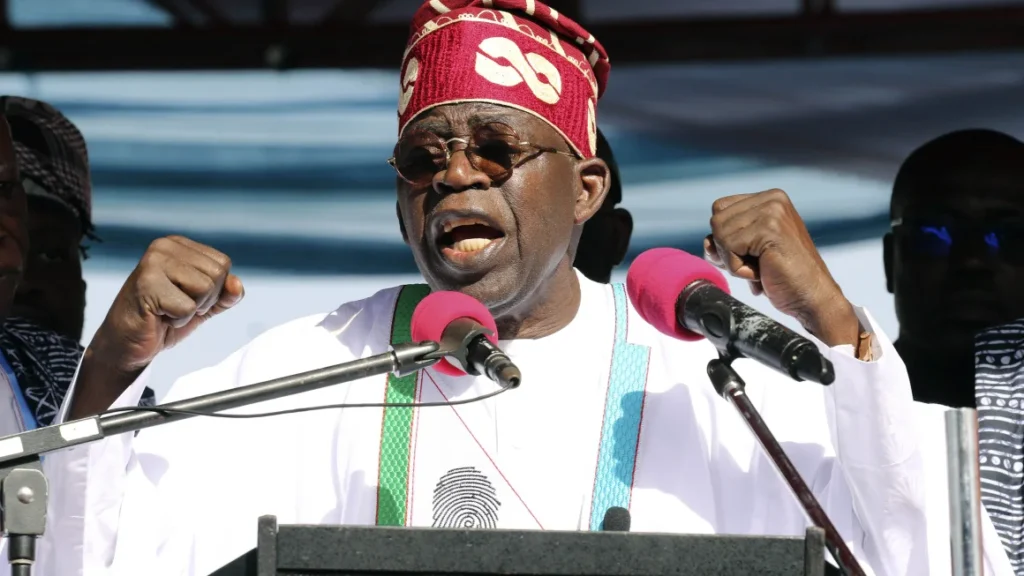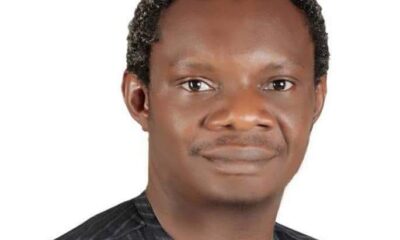EDITORIAL
Bola Ahmed Tinubu: His Leadership, Benefits, and Challenges Overview of Tinubu’s Political Career

Bola Ahmed Tinubu is a prominent Nigerian politician who has played a significant role in the country’s political landscape. Born on March 29, 1952, in Lagos State, Tinubu attended the Chicago State University in the United States, where he graduated with a degree in Accounting. His professional career began in the private sector, spending time working with various firms, including Deloitte and GTE Services Corporation.
Tinubu’s political career took off when he became involved with the National Democratic Coalition (NADECO) in the early 1990s. The coalition was established to oppose military rule in Nigeria and advocate for the restoration of democracy. His active participation in NADECO made him a target for the military regime, leading to his exile in 1994.
Upon returning to Nigeria after the return to democratic rule, Tinubu was elected to represent Lagos West Constituency in the Nigerian Senate in 1992 under the banner of the Social Democratic Party (SDP). However, his tenure was cut short following the dissolution of the senate by military dictator Sani Abacha in 1993.
With Nigeria returning to democracy in 1999, Tinubu became a founding member of the Alliance for Democracy (AD), which aimed to promote progressive governance in Nigeria. In that same year, he campaigned successfully for the governorship of Lagos State. Bola Tinubu served as governor from May 29, 1999, to May 29, 2007. During his tenure, he implemented various reforms focusing on infrastructure development and service delivery. His administration is often credited with transforming Lagos into a more economically viable state through improved tax collection and autonomous governance.
After leaving office as governor, Tinubu remained an influential figure within Nigerian politics. He played a vital role in forming political alliances that eventually led to the establishment of the Action Congress (AC) and later its transformation into the Action Congress of Nigeria (ACN). He was instrumental in forging coalitions that culminated in the formation of the All Progressives Congress (APC) in 2013, which sought to challenge the ruling People’s Democratic Party (PDP).
Tinubu’s contribution towards ensuring a united opposition resulted in remarkable victories during national elections. The APC emerged victorious during the 2015 general elections, leading to Muhammadu Buhari being elected as president, marking a notable end to PDP’s long-standing dominance.
Throughout his political journey, Tinubu has garnered both praise and criticism. Supporters view him as a master strategist and a champion of democracy and development, particularly in Lagos State. Critics have raised concerns about his alleged involvement in political godfatherism and various controversies surrounding his wealth accumulation.
In addition to his roles within political parties and government, Tinubu has been recognized for mentoring numerous politicians who have achieved significant positions within Nigeria’s political framework. His influence remains considerable within both state and national politics.
As of late 2021 into 2023, Bola Ahmed Tinubu declared his intention to run for president ahead of Nigeria’s general elections scheduled for February 2023, continuing to play a pivotal role in shaping Nigeria’s political narrative. His campaign emphasized themes of continuity and progress while aiming to harness his experience for national leadership.
Overall, Bola Ahmed Tinubu’s political career spans several decades filled with notable achievements and challenges that have made him one of Nigeria’s most significant political figures. With ongoing developments leading up to recent elections and beyond, Tinubu’s legacy and influence are likely to unfold further within Nigeria’s evolving political landscape.
Leadership Style and Governance Philosophy
Bola Ahmed Tinubu, a prominent Nigerian politician and the current president as of 2023, has a leadership style and governance philosophy characterized by a mix of pragmatism, strategic vision, and political maneuvering.
Tinubu’s leadership style is often described as hands-on and inclusive. He is known for building alliances and forging partnerships, which have been essential in his political journey from being the governor of Lagos State to his current presidential role. This collaborative approach has allowed him to unite various factions within the political landscape of Nigeria. A defining characteristic of his leadership is his ability to empower others; many of his former aides and associates have gone on to hold significant positions within the government and political sphere. This cultivation of talent reflects his belief in inclusivity and meritocracy.
In terms of governance philosophy, Tinubu emphasizes fiscal responsibility and economic development. During his tenure as governor from 1999 to 2007, he implemented reforms that strengthened the state’s revenue generation capabilities. He prioritized infrastructure development, healthcare improvements, and educational reforms as cornerstones of governance. This focus on comprehensive development aimed to enhance Lagos State’s status as an economic hub in Nigeria and has been recognized for laying the groundwork for contemporary advancements in the city.
Tinubu also advocates for technology adoption in governance. Under his administration in Lagos, efforts were made to integrate tech solutions into public services, ensuring better efficiency and transparency. His early recognition of the importance of technology aligns with his vision for a modernized Nigeria that leverages innovative solutions to tackle challenges such as unemployment and corruption.
However, Tinubu’s leadership hasn’t been without criticism. Some observers point to an entrenched system characterized by patronage politics. Critics argue that while he has achieved notable successes, it raises questions about transparency and accountability within the frameworks he established. The notion of “Tinubuism,” identifying a leadership style that heavily relies on political loyalty, remains a topic of discussion among analysts.
Overall, Bola Ahmed Tinubu stands out as a significant figure in Nigerian politics due to his blend of strategic vision and practical governance approaches. His legacy continues to evolve alongside challenges facing the nation, shaping perceptions of effective leadership in a complex political environment. His initiatives have made lasting impacts but also leave room for debates regarding moral implications and systemic integrity within Nigerian politics.
Major Achievements During His Tenure as Governor of Lagos State
Bola Ahmed Tinubu served as the Governor of Lagos State from May 29, 1999, to May 29, 2007. His tenure is distinguished by several significant achievements that transformed the state in various sectors.
One of Tinubu’s major contributions was in the area of infrastructure development. He prioritized road construction and rehabilitation, leading to the improvement of numerous highways and local roads. This initiative aimed to ease traffic congestion and enhance connectivity within the metropolis. Under his administration, notable projects included the construction of new roads and expansion of existing ones, which were instrumental in shaping the urban landscape of Lagos State.
Tinubu also made substantial advancements in public transportation. He initiated the Bus Rapid Transit (BRT) system, which provided a reliable and efficient public transit alternative that reduced travel times and traffic interruptions. This modern public transport solution is still a vital part of Lagos’s transport infrastructure today.
In terms of education, Tinubu implemented reforms that significantly improved facilities and resources in public schools across Lagos State. His administration focused on upgrading school infrastructure, expanding access to education, and improving educational standards, including better teacher training programs. The introduction of the Lagos State Youth Employment Trust Fund further aimed to empower young residents through skill development and provision of jobs.
Tinubu’s government also placed emphasis on health care services by improving hospitals and clinics throughout Lagos State. He launched several healthcare initiatives focused on reducing maternal and infant mortality rates. The establishment of community health centers provided residents with access to medical services closer to their homes.
Under his leadership, Tinubu introduced reforms aimed at enhancing revenue generation for the state. This approach resulted in increased internally generated revenue, which allowed for funding various developmental projects without overly relying on federal allocations. His strategies included the establishment of new tax systems and guidelines for greater compliance from businesses operating in Lagos State.
Additionally, Tinubu’s administration prioritized urban planning and environmental sustainability. The government strengthened agencies like the Lagos State Urban Renewal Agency to tackle issues related to land use and zoning laws, ensuring structured development along with urban regeneration efforts.
He is also known for his efforts in boosting commerce and industry through support for small and medium-sized enterprises (SMEs). By fostering a business-friendly environment, his tenure attracted investments into various sectors, contributing significantly to job creation and economic growth.
Tinubu’s term had its challenges but is widely credited with laying down a framework for ongoing progress in governance that subsequent administrations continue to build upon. His centric focus on infrastructural upgrades, public service reforms, healthcare improvements, education quality enhancements, urban revitalization, and economic empowerment has left a lasting impact on Lagos State’s development trajectory.
Economic Policies Proposed by Tinubu
Bola Ahmed Tinubu, the President of Nigeria since May 2023, has put forward several economic policies aimed at addressing the country’s numerous challenges and revitalizing its economy. His proposals are often a blend of his past experiences as the Governor of Lagos State and strategies designed to tackle contemporary issues faced by Nigeria.
One of the primary goals of Tinubu’s economic agenda is to enhance Nigeria’s revenue generation and improve fiscal responsibility. He has emphasized the importance of diversifying the economy away from over-reliance on oil revenues, advocating for investment in other sectors like agriculture, technology, and manufacturing. By seeking to increase non-oil revenue sources, Tinubu aims to create a more sustainable economic environment.
Tinubu’s administration is also focused on infrastructural development as a means of spurring economic growth. He proposes significant investments in infrastructure projects such as roads, railways, ports, and electricity to facilitate trade and improve accessibility across the country. This approach is intended not only to create jobs but also to attract foreign direct investment by providing a more robust logistical framework.
Another pivotal aspect of Tinubu’s economic strategy is the emphasis on supporting small and medium enterprises (SMEs) as catalysts for job creation. He has expressed plans to strengthen access to credit for these businesses, as well as improve the business climate through regulatory reforms aimed at reducing bureaucracy and enhancing ease of doing business in Nigeria.
In terms of agriculture, Tinubu prioritizes food security through modernization and technology integration within the agricultural sector. His administration aims to boost local food production to minimize imports, encourage financing solutions for farmers, and enhance various agricultural value chains. This focus reflects a broader vision of making Nigeria self-sufficient while also establishing itself as a competitive player in regional markets.
Moreover, Tinubu’s government acknowledges the importance of human capital development as a cornerstone of economic policy. Investitions in education and health services are considered crucial factors in boosting productivity and quality of life for citizens. Initiatives surrounding skill acquisition programs have also been proposed to equip youths with necessary competencies that align with labor market needs.
Investment in technology and digital transformation forms another critical element of Tinubu’s economic vision. Recognizing the growing role of technology in driving innovation and efficiencies across sectors, he advocates for increased internet penetration, support for tech startups, and building an enabling environment for digital businesses to thrive.
Overall, Bola Ahmed Tinubu’s economic policies focus on diversification, infrastructure development, support for SMEs, agricultural reform, human capital development, and embracing technology. His approach seeks to create a more resilient economy that can adapt to global trends while significantly improving the livelihoods of Nigerians. As his administration works towards actualizing these goals, it will be important to observe how tangible outcomes unfold amid Nigeria’s evolving economic landscape.
Tinubu’s Role in National Politics: Influence and Alliances
Asiwaju Bola Ahmed Tinubu is a prominent figure in Nigerian politics, widely recognized for his influence and strategic alliances. He served as the Governor of Lagos State from 1999 to 2007 and has since played a significant role in shaping national political dynamics in Nigeria.
Tinubu’s political journey began in the late 1980s when he became associated with various pro-democracy groups during Nigeria’s military rule. His exit from exile coincided with Nigeria’s transition to democracy in the late 1990s, positioning him as a key political player in Lagos. As governor, he implemented several reforms that transformed Lagos into a hub of economic activity, which bolstered his reputation and created a loyal support base.
One of Tinubu’s most notable contributions to national politics is his role in the formation of the All Progressives Congress (APC) in 2013. The APC was formed through an alliance of various opposition parties united by their goal to challenge the then-ruling People’s Democratic Party (PDP). His prowess in forging partnerships with political leaders across different regions laid the groundwork for a successful coalition that ultimately led to the election of Muhammadu Buhari as president in 2015, ending the PDP’s long-standing dominance.
Tinubu’s influence extends beyond party politics; he is often referred to as a kingmaker due to his ability to mobilize resources and people. His endorsement carries significant weight, and he has been instrumental in the political fortunes of many politicians at both state and national levels. His network spans various regions, and he maintains relationships with powerbrokers from diverse backgrounds.
In addition to his role as an influencer, Tinubu has demonstrated an understanding of political pragmatism. He often emphasizes the importance of building alliances based on mutual interests rather than strict ideological lines. This approach has allowed him to maintain relevance and expand his political reach over time, adjusting tactics in response to changing political landscapes.
However, Tinubu’s career has not been without controversies, including accusations regarding corruption and questions about his age and qualifications. Nevertheless, his supporters argue that his achievements as a politician and administrator speak for themselves.
Going forward, Tinubu remains a significant player as Nigeria approaches critical electoral milestones. His relationships with party members, governors, and influential stakeholders suggest that he will continue to shape policy discussions and electoral strategies. Whether through the APC or other political maneuvers, Tinubu’s legacy will likely endure as a central theme in Nigeria’s evolving political narrative.
Challenges Faced by Tinubu in Office and How He Overcame Them
As Nigeria’s president, Bola Ahmed Tinubu has faced a range of significant challenges since assuming office. Understanding these obstacles and his strategies for addressing them provides insight into his leadership style and the broader political landscape of Nigeria.
One of the most pressing challenges Tinubu encountered was the dire economic situation. When he took office, Nigeria grappled with high inflation rates, fluctuating oil prices, and a depreciating currency. This economic turmoil impacted daily life, leading to increased food prices and general hardship for many citizens. In response, Tinubu announced a multi-faceted economic reform strategy aimed at stabilizing the economy. This included efforts to boost agricultural production, strengthen local industries, and seek international investments. The administration also worked on improving tax collection and revenue generation to reduce dependency on oil.
Another significant issue was the insecurity gripping various parts of Nigeria, characterized by banditry, terrorism, and inter-communal violence. The northeastern region particularly suffered from the activities of Boko Haram and other extremist groups. In an effort to address these security concerns, Tinubu prioritized enhancing military funding and equipment while working toward an integrated approach that involved community engagement and support from local leaders. Establishing better intelligence networks to anticipate threats was also part of his strategy.
The education sector posed additional challenges as well. Poor infrastructure, overcrowded classrooms, and an insufficient number of qualified teachers hindered educational progress. Recognizing the essential role of education in nation-building, Tinubu launched initiatives aimed at improving school facilities, updating curriculums to meet modern needs, and promoting vocational training programs to equip youth with practical skills.
Healthcare deficiencies were another area that required urgent attention under Tinubu’s leadership. Many hospitals struggled with inadequate resources, leading to poor health outcomes for citizens. In response, his government focused on increasing healthcare funding and initiating initiatives such as the revitalization of primary healthcare services. Partnerships with private healthcare providers were also explored to expand access and improve service delivery.
Tinubu faced political challenges within his governing coalition as well, given Nigeria’s varied ethnic and political landscapes. Managing differing interests while striving for national unity required careful negotiation and strategic appointments to key positions in government to reflect Nigeria’s diversity.
Additionally, perhaps one of the most significant challenges was restoring citizens’ trust in government institutions which had been damaged by corruption scandals and inefficiencies in prior administrations. To combat this image problem, Tinubu emphasized transparency in governance practices and established anti-corruption measures that sought accountability across all levels of government.
Through tenacity and strategic policymaking efforts focused on dialogue with stakeholders nationwide—coupled with aims at coalition-building—Tinubu sought to tackle both immediate issues as well as long-term structural changes within Nigerian society.
In summary, President Bola Ahmed Tinubu faces numerous obstacles regarding economics, security, education, healthcare disparities, political complexities, and corrupt practices within government structures. While still early in his tenure—and with ongoing struggles—Tinubu’s responses illustrate his determination to implement his vision for a stable and prosperous Nigeria. His efforts focus not only on current crises but also on sustainable solutions that can rejuvenate confidence in both government institutions and national stability over time.
Public Perception of Tinubu: Supporters vs Critics
Public perception of Bola Ahmed Tinubu, the former governor of Lagos State and the current President of Nigeria as of 2023, is a complex and nuanced topic shaped by a variety of factors including his political history, influence in Nigerian politics, and recent developments in his administration.
Supporters of Tinubu regard him as a significant figure in reforming Lagos State during his tenure from 1999 to 2007. They credit him with implementing policies that improved infrastructure, healthcare, and education in Lagos. His role in the formation of the All Progressives Congress (APC), which helped end the long reign of the People’s Democratic Party (PDP) in 2015, has also endeared him to many. Supporters see him as a skilled political strategist who has paved the way for other leaders within the party and argue that he has a vision for national development that could steer Nigeria towards progress. Among his base, he often wins praise for being a champion of the South-West’s interests and enhancing opportunities for local governance.
However, critics underline several aspects of Tinubu’s political career that taint their perception of him. Some allegations regarding corruption have shadowed his political narrative. Critics have raised concerns about the financial transparency of his governorship and question how wealth accumulated over the years was generated. Additionally, detractors argue that his emergence as president exemplifies the entrenched problem of political dynasties and patronage in Nigeria, viewing it as a continuation of elite control rather than a shift toward accountability or reform.
Tinubu’s administration faces significant challenges, including economic difficulties characterized by high inflation rates and security issues such as banditry and militancy. Critics assert that his leadership style does not address these pressing concerns adequately and accuse him of populism without substantive action. The gap between the experiences laid out by supporters regarding progress made during previous tenures versus current expectations under his leadership highlights a growing divide.
Amidst polarized opinions, public views on Tinubu often cut across regional, ethnic, and party lines. While many in the Southwest express pride in his successes and the perceived improvements brought about during his governorship, individuals from other regions may feel marginalized or skeptical about promises made by his administration. This contradiction speaks to broader questions about national unity and inclusive governance in Nigeria.
Overall, Bola Ahmed Tinubu remains a polarizing figure in Nigeria whose legacy is yet to be fully determined, as opinions continue to evolve based on ongoing political developments, economic performance, and social issues facing Nigerians today.
The Impact of Tinubu’s Leadership on Youth and Education
Bola Ahmed Tinubu, the former governor of Lagos State and the current President of Nigeria, has had a significant impact on youth and education in the country. His leadership style and policies have drawn mixed reactions, yet they undeniably reflect an era of transformative change.
Tinubu’s administration in Lagos State, which lasted from 1999 to 2007, marked a pivotal time for educational reforms. Recognizing education as a cornerstone for development, his government initiated numerous programs aimed at improving both access and quality of education. One notable initiative was the modernization of primary and secondary schools. Infrastructure was upgraded, including renovations and construction of new classrooms. These improvements aimed at creating a more conducive learning environment for students.
Additionally, Tinubu’s government implemented policies to boost teacher training and development. By focusing on the professional growth of educators, he aimed to enhance the quality of instruction and ensure that teachers were better equipped to meet the needs of their students. This investment in human capital was essential for creating a skilled workforce that could contribute positively to society.
Under Tinubu’s leadership, there was also a concerted effort to increase access to tertiary education. He initiated programs that encouraged the establishment of private universities and higher institutions in several sectors. This not only reduced the burden on public universities but also provided options for young Nigerians seeking higher education. The accompanying legislation streamlined processes and facilitated partnerships between public and private institutions, fostering collaboration to improve educational outcomes.
Tinubu is known for championing youth involvement in politics and governance. His philosophy embraced the idea that young people should play active roles in shaping their future. By mentoring future leaders through structures such as political parties and organizations, he instilled a sense of responsibility among the youth to engage in civic matters. This involvement cultivated a spirit of entrepreneurship and activism among young Nigerians.
In terms of creating job opportunities for youth, Tinubu’s emphasis on economic development through infrastructure projects generated employment in various sectors. As Lagos transformed into a commercial hub during his tenure, many young people found job prospects in emerging markets created by these developments.
However, critiques have arisen over how effectively these policies translated into tangible benefits for all segments of Nigerian society. While some districts experienced viable improvements in education and employment opportunities, others were left without adequate resources or access to quality education.
In contemporary governance under President Tinubu, there continues to be a focus on youth-related initiatives and educational reform. His perspective on integrating technology into education reflects broader global trends. Adopting digital learning platforms aims to address the challenges posed by traditional schooling methods, especially revealed during crises like the COVID-19 pandemic.
Looking ahead, it is vital for Tinubu’s administration to continue engaging with stakeholders—such as educators, parents, and community leaders—to create strategies that adapt to changing educational needs. Developing programs that foster entrepreneurship among young people will be crucial for sustainable job creation as technology reshapes industries.
Overall, Tinubu’s leadership has had both short-term successes and long-term implications for youth and education in Nigeria. By prioritizing foundational changes during his governorship while navigating contemporary issues as president, his impacts are likely to be felt across generations if sustained momentum continues towards inclusive educational opportunities and empowerment.
Understanding Tinubu’s Approach to Infrastructure Development
Understanding Bola Ahmed Tinubu‘s approach to infrastructure development requires an examination of his time as governor of Lagos State from 1999 to 2007 and his subsequent influence on Nigerian politics. Throughout his tenure, Tinubu focused heavily on improving public infrastructure, recognizing that it plays a crucial role in economic growth and citizen welfare.
One cornerstone of Tinubu’s strategy was the emphasis on public-private partnerships. He believed that collaboration between the government and private sector would attract investment and drive projects forward. This approach not only helped to finance major initiatives but also allowed for greater innovation and efficiency in executing infrastructure projects.
During his governorship, Tinubu initiated numerous road construction and rehabilitation programs aimed at easing traffic congestion in Lagos—a city notorious for gridlock. His administration oversaw the construction of key roadways, like the Lekki-Epe Expressway, which improved access to previously underdeveloped areas. This initiative encouraged real estate development and better connectivity within the state.
Water supply management was another area of focus. Tinubu’s government sought to improve water delivery systems, though challenges remained regarding widespread access. His plans included repairing old infrastructure as well as constructing new facilities, particularly in underserved communities.
Tinubu also laid the groundwork for massive investments in public transport. Under his leadership, the Bus Rapid Transit (BRT) system was established as a revolutionary public transportation option designed to reduce travel time and increase accessibility for Lagos residents. This initiative showcased his commitment to developing reliable transit systems that protect the environment and boost economic activity.
Additionally, Tinubu championed urban renewal efforts aimed at upgrading living conditions across Lagos. By addressing issues such as housing deficits and sanitation, he strived to foster a more livable urban environment while aiming to confront challenges related to rapid population growth.
On a broader scale, Tinubu’s vision for infrastructure development extends beyond Lagos. As a significant figure in Nigeria’s All Progressives Congress (APC) political party, he has often advocated for nationwide infrastructure improvements that encompass roads, railways, power generation, and telecommunications. His strategies usually involve rallying stakeholders from various levels of government and engaging international partners to facilitate progress.
Furthermore, Tinubu acknowledges the innate linkage between infrastructure development and job creation—believing that when infrastructure flourishes, so too do opportunities for employment within sectors like construction and logistics. He aims not only at sustaining immediate employment but also at creating avenues for long-term economic prosperity through enhanced infrastructures like schools, hospitals, and other essential services.
In summary, Bola Ahmed Tinubu’s approach to infrastructure development reflects a strategic blend of public-private partnerships, innovation-driven solutions, effective transportation systems, urban renewal projects and a national vision framework. As he continues to shape the discourse around governance in Nigeria, examining his past successes allows one to predict potential influence on future infrastructural policies under any new administrative frameworks he may have impacted or collaborated with moving forward.
Analysis of Tinubu’s Role in the Formation of the All Progressives Congress
Bola Ahmed Tinubu is a prominent figure in Nigerian politics and plays a crucial role in the formation of the All Progressives Congress (APC), which was established in 2013. His political career and influence can be traced back to when he served as the Governor of Lagos State from 1999 to 2007. Tinubu’s vision for a unified political front began to take shape in response to concerns about leadership quality and the declining state of governance in Nigeria.
The genesis of the APC can be attributed to Tinubu’s desire to create a formidable alternative to the Peoples Democratic Party (PDP), which had been in power since the end of military rule in 1999. Logistic infrastructural challenges within the PDP prompted various party affiliates, including some defunct parties such as the Action Congress of Nigeria (ACN), All Nigeria Peoples Party (ANPP), and Congress for Progressive Change (CPC), to seek collaboration under a common platform. Tinubu, representing the ACN, became one of the key architects behind this coalition.
One factor that underscored his involvement was his deep political networks and resources that he had built during his time as governor. His ability to rally support from diverse stakeholders and leverage alliances with smaller parties was instrumental. Around this time, there was growing discontent among Nigerians regarding security issues, economic challenges, and governmental maladministration. This perceived inadequacy of the PDP also motivated Tinubu and like-minded politicians to forge a new political alliance.
The formalization of this alliance came with considerable negotiations between major political players, including Muhammadu Buhari, who represented the CPC; Abdul Farouk Adamu Aliyu from ANPP; and Tinubu himself. In July 2013, after extensive deliberations, they announced the formation of the APC in historic meetings characterized by unprecedented unity among opposition forces.
Tinubu’s role extended beyond merely rallying allies. He was heavily involved in strategizing the party’s framework including its ideology and electoral strategies leading up to the 2015 general elections. The successful outcome of these elections, with Buhari winning the presidency and several states gliding into APC’s control, enhanced Tinubu’s stature as a pivotal figure within Nigerian politics.
His influence stretched into legislative choices as well. After Buhari assumed office, there were intense discussions about leadership roles that further emphasized Tinubu’s bargaining power within both party dynamics and national governance approaches for setting up critical committees and nominating key positions.
Despite facing challenges over party loyalty dynamics, defections, and criticisms regarding party management—the discourse on missing cohesion within ranked party members such as those loyalists—including transportation plans for addressing urban development grievances—Tinubu has managed to maintain significant sway not just within the APC but across Nigeria’s political landscape.
Overall, Bola Ahmed Tinubu stands out as an architect of modern Nigerian politics particularly through his leadership during the founding of the APC. His influence resonates significantly in today’s governance discourse as APC continues shaping Nigeria’s direction in various areas amidst evolving priorities concerning accountability and national coherence.
Social Programs Initiated Under Tinubu’s Administration
Bola Ahmed Tinubu, as the former Governor of Lagos State and a prominent figure in Nigerian politics, initiated various social programs aimed at addressing the needs of the state’s residents. While his tenure ran from 1999 to 2007, many of his initiatives had lasting impacts on governance and social infrastructure.
One significant aspect of Tinubu’s administration was the focus on education. He prioritized educational reforms that included the revitalization of schools and improvement in teacher training. His administration initiated schemes to provide free primary education and implemented policies to build new school facilities, ultimately increasing access to quality education for primary and secondary students.
In health care, Tinubu’s administration worked on improving healthcare services through the establishment of new health facilities. His government emphasized the importance of health insurance schemes aimed at enhancing citizens’ access to medical services, particularly for those in less privileged communities. This included initiatives to ensure maternal and child health provisions as well as vaccination programs.
Tinubu also placed importance on public transportation through the development of road infrastructure. His administration undertook substantial remodeling efforts to ease traffic congestion in Lagos. The introduction of bus rapid transit (BRT) systems was among his hallmark projects, aimed at creating efficient and affordable public transport options for Lagosians.
His administration was marked by efforts to enhance urban development, leading to various housing initiatives that sought to improve living conditions for low- and middle-income families. While challenges remained in the housing sector, Tinubu pushed for policies that addressed accommodation issues within the urban sprawl of Lagos.
Additionally, in an effort to empower youth and reduce unemployment, various vocational training programs were introduced under his leadership. These programs focused on equipping young people with practical skills to enhance their employability in a rapidly changing job market.
In terms of economic empowerment for women, Tinubu’s administration launched several initiatives designed to promote female entrepreneurship and ownership through microcredit schemes, aiming to support women’s self-sufficiency.
Tinubu’s government also recognized the importance of social safety nets. He initiated programs targeting poverty amelioration aimed specifically at assisting vulnerable populations within Lagos State.
While assessing Tinubu’s contributions, it is important to consider that some critics have argued about accountability regarding funding and implementation of these programs. Nonetheless, these social initiatives acted as foundational elements that influenced subsequent administrations in Lagos State.
Overall, Bola Tinubu’s administration laid out a blueprint for social intervention programs that larger-scale governance at both state and national levels could draw lessons from, significantly shaping socio-economic policies intended for public welfare in Nigeria.
The Controversies Surrounding Bola Ahmed Tinubu
Bola Ahmed Tinubu is a prominent Nigerian politician known for his role as the former governor of Lagos State and as a key figure in the ruling All Progressives Congress (APC). Throughout his political career, he has been involved in several controversies that have drawn significant public attention and debate.
One major controversy surrounds Tinubu’s academic credentials. Questions have been raised regarding the authenticity of his degree from Chicago State University. Although he has repeatedly asserted that he graduated with a degree in accounting, skeptics have cited discrepancies in the documentation surrounding this claim. These discussions often resurface during election cycles, contributing to a polarized perception of his qualifications.
Another area of concern pertains to accusations of corruption. Tinubu has faced multiple allegations related to misappropriation of funds and abuse of power during his tenure as governor (1999-2007). Critics highlight discrepancies between the financial resources allocated to Lagos State and the state’s current infrastructure and social services. Although no formal charges have been filed against him, these accusations have tainted his image among opposition parties and certain segments of the public.
Furthermore, his political maneuvers in forming alliances and consolidating power within the APC have also attracted scrutiny. While some view him as a political strategist who has played a vital role in the APC’s successes, others see him as someone who employs divisive tactics to ensure loyalty and control over party affairs. This duality feeds into larger discussions about political patronage, nepotism, and governance ethics in Nigerian politics.
Tinubu’s health has periodically come under the microscope. His public appearances can often spark debates about his physical fitness for leadership roles, particularly when he was campaigning for higher office or during periods when he failed to appear for extended durations at events. Speculation around his health has fueled rumors and provided fodder for opponents who question his capacity to lead.
Moreover, as Nigeria faces significant sociopolitical issues, such as security challenges and economic instability, critics argue that Tinubu’s decades-long influence on Lagos politics raises questions about his accountability and overall impact on national governance. Many opponents argue that instead of progress, there might be a pattern of stagnation and erosion of government integrity tied to Tulubus pervasive influence.
Amidst these controversies are also persistent narratives praising Tinubu for his contributions to Lagos State’s economic transformation. Supporters often point out his roles in urban development projects, infrastructure initiatives, and boosting the state’s revenue generation during his tenure. This reputation for accomplishments stands in stark contrast to the controversies that shape perceptions of him differently among various demographic groups.
In conclusion, Bola Ahmed Tinubu remains one of Nigeria’s most consequential yet controversial politicians. His legacy intertwines achievements with echoes of structural corruption, questionable educational claims, strategic alliances, and ongoing debates about health and fitness for leadership roles. As Nigeria continues its dynamic political landscape ahead of future elections, the discourses around Tinubu will remain significant as he pursues further political aspirations.
Continuous Legacy: How Tinubu Has Shaped Modern Nigerian Politics
Bola Ahmed Tinubu, a prominent Nigerian politician and leader of the All Progressives Congress (APC), has had a profound influence on the political landscape of Nigeria. His legacy is often discussed in the context of how he has shaped modern Nigerian politics.
Tinubu first gained prominence as the governor of Lagos State from 1999 to 2007. During his tenure, he implemented significant reforms and policies that transformed Lagos into one of Africa’s largest and most vibrant cities. His approach towards governance included enhancing the state’s revenue generation, improving infrastructure, and advancing public services. These efforts not only boosted Lagos’ economy but also set a model for governance that other states have sought to emulate.
One key aspect of Tinubu’s legacy is his role as a political strategist and kingmaker. He was instrumental in the formation of the APC in 2013, which succeeded in breaking the longstanding dominance of the People’s Democratic Party (PDP) in Nigerian politics. By uniting various opposition factions under a single umbrella party, Tinubu played a crucial role in changing the political dynamics in Nigeria. His ability to forge alliances and build coalitions has been pivotal in establishing a new political order.
Tinubu’s influence extends beyond party politics; he is often seen as a mentor to many rising politicians in Nigeria. Numerous leaders at both state and national levels credit him for their political rise, highlighting his role in nurturing talent and promoting loyalty among allies. This network of loyalists ensures that his influence remains intact, even as new generations come into power.
Moreover, Tinubu’s economic and development initiatives during his governorship laid the groundwork for ongoing debates about fiscal responsibility and accountability in Nigerian states. His administration emphasized public-private partnerships, which spurred investments and development projects essential for urban growth.
In recent years, Tinubu has continued to play a crucial role in Nigerian politics, particularly as he contested for the presidency in the 2023 elections. The campaign reflected his enduring legacy as it drew upon his achievements in Lagos and his extensive political network across Nigeria. His focus on economic issues, security challenges, and efforts to unify various regions resonated with many voters seeking effective leadership.
Critiques of Tinubu often highlight issues like corruption and concerns over political dynasties, questioning the long-term implications of his influence on democracy in Nigeria. Nevertheless, supporters argue that his initiatives have fostered modern political engagements and participation at various levels.
Overall, Bola Ahmed Tinubu’s continuous legacy is woven into the fabric of modern Nigerian politics through his innovative governance strategies in Lagos, pivotal role in national coalitions, commitment to mentoring new leaders, and sustained relevance within political processes. As such, analyzing his contributions affords insight into the evolving nature of governance and political allegiances in Nigeria today.
Comparison of Tinubu’s Leadership with Other Political Figures in Nigeria
Bola Ahmed Tinubu, the former governor of Lagos State and the current president of Nigeria, is a prominent figure in Nigerian politics. His leadership style and political strategies have often been compared to those of other notable political figures in Nigeria, such as Olusegun Obasanjo, Muhammadu Buhari, and Atiku Abubakar.
Tinubu’s tenure as governor of Lagos from 1999 to 2007 is often marked by significant economic development and infrastructural improvements in the state. He implemented reforms that increased internally generated revenue, making Lagos one of the most financially independent states in Nigeria. This ability to generate revenue contrasts sharply with other leaders who relied heavily on federal allocations. For instance, during Obasanjo’s presidency, there was criticism regarding the management of federal resources and infrastructure development across the country, which did not yield significant outcomes for several regions.
Unlike Tinubu’s focused approach on fiscal reform in Lagos, Muhammadu Buhari’s government faced challenges with economic stagnation and security issues during his presidency. Buhari was criticized for his inability to diversify Nigeria’s economy away from oil dependency, whereas Tinubu’s model illustrated how state-level governance could lead to diversification through pragmatic fiscal policies. Additionally, Tinubu benefited from a strong party structure; he played a crucial role in the formation of the All Progressives Congress (APC), which has given him substantial influence compared to others who primarily relied on existing political frameworks.
Having risen through grassroots mobilization eventually leading to considerable electoral victories, his political acumen is often contrasted with Atiku Abubakar, another political heavyweight whose reputation largely stems from a background in business rather than grassroots activism. Atiku’s attempts to consolidate power have sometimes been marked by internal party disagreements, a situation less visible in Tinubu’s political maneuvering within the APC.
Personal charisma and political networks are other pertinent attributes when comparing these leaders. Tinubu is recognized for his strategic use of alliances and patronage politics. His knack for building coalitions has often yielded favorable electoral results even amid accusations of nepotism and favoritism. While figures like Buhari emphasize a more austere military background reflecting discipline but sometimes failing in party collaboration, Tinubu’s politically savvy style illustrates adaptability in navigating Nigeria’s often turbulent political waters.
In terms of handling dissent and opposition, Tinubu has shown a distinct approach as well. While Obasanjo was at times viewed as authoritarian—implementing strict measures against dissenters—Tinubu tends to balance assertiveness with political pragmatism. His ability to engage rivals or co-opt them into partnerships indicates a nuanced understanding of power dynamics that some predecessors failed to leverage effectively.
Overall, Bola Ahmed Tinubu’s leadership stands out for its blend of innovation in governance at the state level alongside strategic political maneuvering at the federal level. His legacy is deeply shaped by proactive economic reforms contrasted against narratives of stagnation or mismanagement seen under other administrations. As he navigates contemporary challenges as president, comparisons with figures like Obasanjo, Buhari, and Atiku shed light on varying approaches towards governance in Nigeria’s complex political landscape. Understanding these comparison aspects provides deeper insights into the trajectories of Nigerian polity encompassing leadership styles, strategies engaged by influential figures over time, and implications it holds for future governance practices in the country.
Assessing the Future of Nigeria Under Tinubu’s Continued Leadership
As Nigeria continues to navigate complex social, economic, and political challenges, the role of President Bola Ahmed Tinubu becomes increasingly critical in shaping the future of the nation. Tinubu assumed office in May 2023, bringing with him a wealth of experience as a former governor of Lagos State and a significant figure in Nigerian politics.
Assessing the future of Nigeria under Tinubu’s leadership involves examining various sectors, including the economy, security, health care, and infrastructure. Nigeria’s economy has long been characterized by dependency on oil revenues. Tinubu faces the daunting task of diversifying the economy to create sustainable growth and job opportunities for its teeming population. The effectiveness of his economic policies will be crucial in alleviating poverty and fostering entrepreneurship.
Security remains a pressing issue for Nigeria, with challenges posed by insurgency, banditry, and communal conflicts. The administration’s approach to enhancing national security is vital in restoring confidence among citizens and potential investors. Strengthening law enforcement agencies and addressing systemic corruption within these institutions will be essential for creating a safe environment where businesses can thrive.
Health care is another area that demands immediate attention. Nigeria’s health system has suffered from underfunding and inefficiencies. Developing robust health policies that ensure accessible and affordable healthcare will be imperative for improving the populace’s overall well-being and productivity.
Infrastructure development is a cornerstone of Tinubu’s agenda. Investing in roads, electricity supply, and internet connectivity will unlock significant economic potential. The administration must prioritize these projects to foster trade and connect rural communities with urban centers.
Furthermore, Tinubu’s foreign policy will play an instrumental role in positioning Nigeria on the global stage. Strengthening diplomatic ties while promoting trade agreements can enhance Nigeria’s influence in Africa and beyond.
Public perception also acts as a barometer for any government’s success. Therefore, effective communication about government initiatives alongside efforts to curb corruption will influence trust levels between citizens and the administration.
Challenges such as tribalism or conflicting regional interests could pose additional hurdles for Tinubu’s governance style. Building a cohesive national identity while managing diverse interests will require strategic dialogue and inclusive policies.
Ultimately, assessing Nigeria’s future under Tinubu encompasses a multidimensional analysis that considers policies effectively addressing these critical sectors. Observers will look closely at both immediate policy implementations and their longer-term impacts on stability and growth.
In summary, President Bola Ahmed Tinubu is at a crossroads where decisive leadership could potentially steer Nigeria toward progress or deeper crises. Balancing economic reforms with social integration and security measures will be pivotal in determining the path forward for this intricate nation as it grapples with both internal issues and its aspirations on the world stage.
Discover more from Asiwaju Media
Subscribe to get the latest posts sent to your email.
-

 NEWS2 days ago
NEWS2 days agoDavid Beckham Hospitalized With Arm Injury As Victoria Shares Update
-

 POLITICS6 days ago
POLITICS6 days agoEbonyi Rep Member Threatens Constituent for Supporting Charity Foundation
-

 NEWS6 days ago
NEWS6 days agoCable Vandals Nabbed by Nigerian Hunters in Okpuitumo, Handed Over to Police
-

 NEWS1 day ago
NEWS1 day agoMan Heartbroken As Girlfriend Of 2 Years Denies Him During Interview With YouTuber Asherkine At UNN
-

 ENTERTAINMENT1 day ago
ENTERTAINMENT1 day agoFrank Edoho Confirms Split From Second Wife Sandra Onyenuchenuya
-

 CAMPUS REPORTS4 days ago
CAMPUS REPORTS4 days agoAE-FUNAI to Unbundle Mass Comm Programme into Eight New Disciplines – VC
-

 SPORTS3 days ago
SPORTS3 days agoVictor Osimhen Acquires 2025 Rolls-Royce Cullinan Worth Over ₦900 Million
-

 ENTERTAINMENT1 day ago
ENTERTAINMENT1 day agoNollywood Mourns As Actor And Producer Kayode Peters Reportedly Passes Away In Canada
-

 SPORTS2 days ago
SPORTS2 days agoAbakaliki FC Faces Kwara United Today in Federation Cup Final
-

 INSIDE NYSC4 days ago
INSIDE NYSC4 days agoNYSC Officer Clarifies Allowance Payments, Warns Corps Members on BVN Errors
-

 ENTERTAINMENT5 days ago
ENTERTAINMENT5 days agoTems Gifts Fan ₦3 Million For Stunning Crochet Portrait
-

 JOBS/SCHOLARSHIPS6 days ago
JOBS/SCHOLARSHIPS6 days agoCDCFIB Announces Nationwide Recruitment into Paramilitary Agencies
















